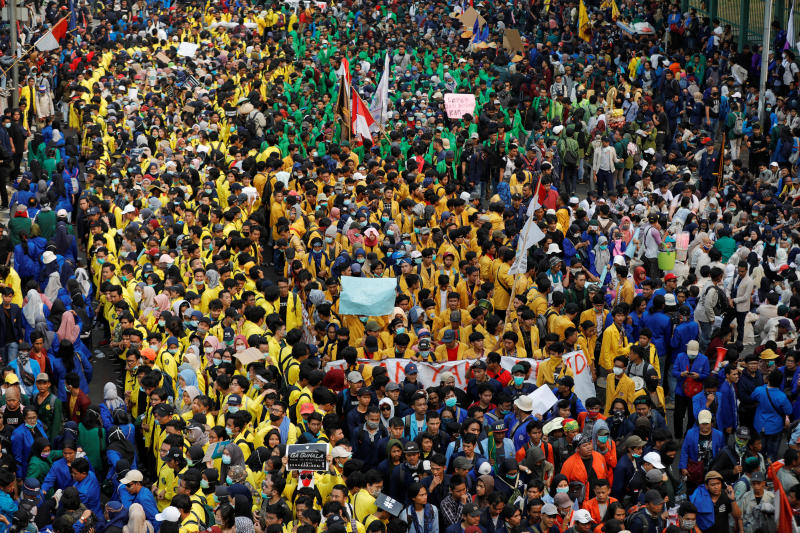
JAKARTA: Protesters rallied for a third day in Indonesia against a number of controversial laws amid concern the violent public demonstrations risk damaging growth and stability in Southeast Asia’s biggest economy.
Thousands of people rallied Wednesday in cities across Indonesia, local media reported, protesting against sweeping legislation that would outlaw sex outside of marriage, infringe on gay rights and potentially derail efforts to attract more foreign investors. The protesters -- mostly students -- are also angry over a law passed last week that weakened the authority of the country’s Corruption Eradication Commission.
While the proposed changes are viewed by analysts as a winding back of democracy, and a risk to the investment climate, Finance Minister Sri Mulyani Indrawati warned the violent protests in Jakarta and elsewhere on Tuesday could threaten business sentiment.
“We will keep communicating to the business players that Indonesia remains stable and well-managed,” Indrawati told reporters on Wednesday.
Indrawati had earlier warned that positive sentiment and significant inflows to Indonesia from interest rate cuts as well as quantitative easing in Europe and the US could be at risk. “Hence, we might have to guard the current situation to bring back the momentum and stability, so that we can focus more on the external risks,” she said Tuesday.
Police used tear gas and water cannons to repel protesters near the parliament building in Jakarta on Tuesday, with the demonstration turning violent. The clashes left 265 students and 36 policemen injured, the police said Wednesday.
The US embassy in Jakarta on Wednesday warned of the possibility of more demonstrations in the coming days and advised its citizens to avoid areas affected by the protests.
While President Joko Widodo last week moved to delay the changes to the criminal code, they may still be reintroduced when the new parliament is sworn in next month. The house had initially been expected to pass the criminal code changes, before Widodo moved to delay the legislation.
The wide-ranging legislation would also clamp down on abortions, dissent and freedom of speech.
“Passing these controversial revisions to the country’s criminal code would send a terrible signal to foreign investors,” said Hugo Brennan, principal political analyst with Verisk Maplecroft. “Companies with a physical presence in Indonesia will be scrambling to understand the significant human security risks that the bill would pose to their workforce, if passed into law.”
Second Term
The latest unrest comes as Jokowi, as the president is known, prepares to be sworn in for a second term next month. He has also faced anger over changes to an anti-corruption law that human rights groups said would deal a blow to efforts to tackle graft.
“President Jokowi’s reformist credentials are in tatters following his failure to prevent the House weakening the Corruption Eradication Commission,” Brennan said. “A failure to step in a second time would represent a mortal blow to his much-dented reputation as a broadly progressive politician,” he said.
Violence also flared in Indonesia’s restive Papua region on Monday with as many as 32 people killed and dozens more injured. The resource-rich Papua region has been dealing with a low-level insurgency for decades and was rocked by separatist protests last month.